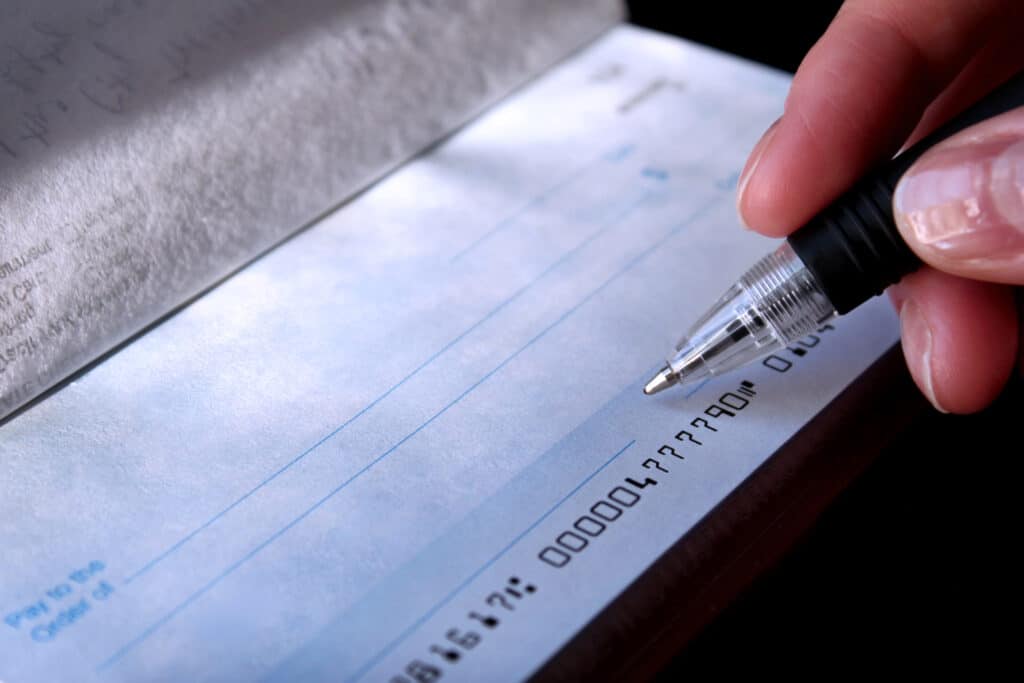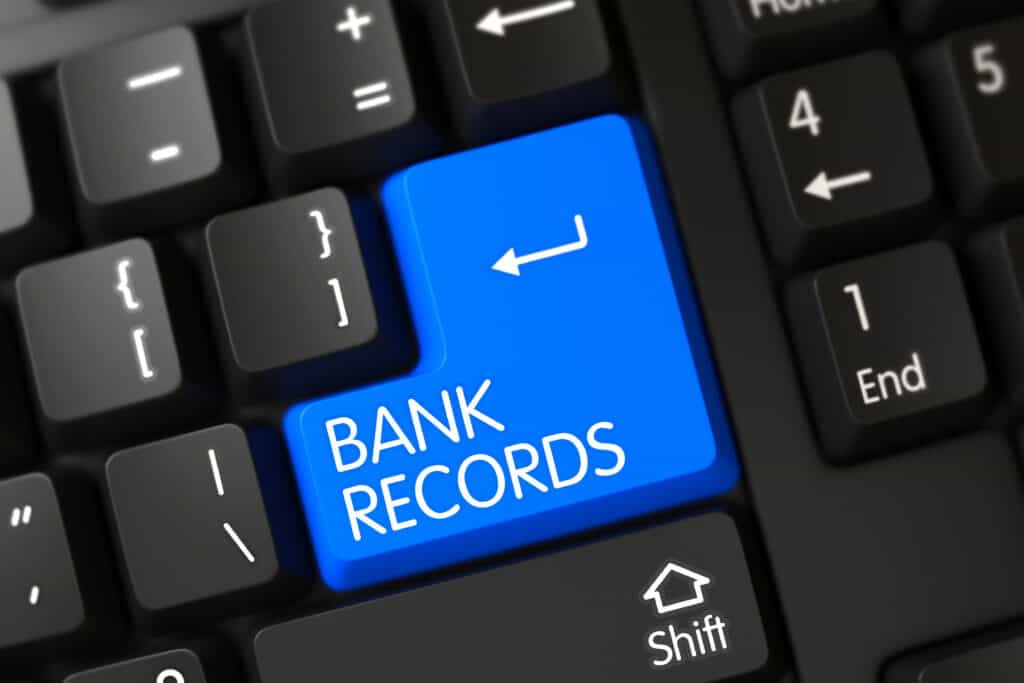In the modern world, where it can be difficult to keep track of finances, it is important for banks to have a record of every check that has been cashed. Knowing whether a particular bank keeps records of checks that have been cashed can help an individual better manage their financial affairs and stay on top of any potential issues. In this article, we’ll explore the different ways banks keep records of cashed checks and how this information might be useful to individuals.
Want to see your credit score for free and be able to use many financial tools right now? Just click here!

Definition of Cashed Checks
Cashier’s checks, also known as bank checks, certified checks, and official checks, are a type of guaranteed payment for goods and services. These special instruments are issued by the payor’s financial institution directly to the intended recipient without the need for their personal banking information.
Typically when something is ‘cashed’ it means that its value has been received in exchange for goods or services. With cashier’s checks, once they have been written by an authorized person at a designated financial institution and delivered to the recipient, they become cashed upon receipt. The recipient is liable for depositing or cashing it immediately since it bears the amount of funds necessary to cover the purchase already stapled to its face. Once these payments are cashed, they cannot be reversed due to having already been secured and forwarded to their corresponding party.
Click Here to Check Your Credit Score for Free!
Overview of Banks and Records
Banks are essential organizations in the modern structuring of an economy. Beyond offering services to customers, banks provide necessary functions in order to keep an accurate record of economic performance. Banks create financial records for their account holders and investors that reflect accounts payable, accounts receivable, transactions, deposits, and disbursements – all necessary to measure monetary performance over time.
Loans and investments, in particular, can be tracked via a number of data points kept by banks; while individual contracts play out according to certain parameters agreed upon by borrowers and lenders, tracking these long-term commitments helps lenders better understand market trends and opportunities. Banks also serve a crucial role in flagging or preventing fraudulent activity. All these represent real and measurable visibility into the health of economies around the world on both micro and macro levels.
Do Banks Keep Records of Cashed Checks?
Yes, banks keep records of cashed checks. The most common way banks track this information is in the form of a database that contains all check deposits and withdrawals for each account holder. This record can be accessed by the bank’s staff, account holders or authorized third parties. Banks also store physical copies of checks in order to comply with regulatory requirements and maintain an audit trail.
In certain cases, banks may provide a copy of the check to account holders upon request. This information can help individuals track their spending patterns and stay on top of any potential issues or discrepancies with their financial accounts.
What is the Standard Practice?
Standard practice for cashing checks is a procedure that provides transparency and records of sent and received money. It involves following a set of administrative steps, including recording the date, amount, presenter, and recipient of the check in order to generate an audit trail of financial transactions. Records must also be kept permanently and securely in accordance with regulatory requirements. By closely monitoring these records throughout the entire process, organizations can ensure they are taking the necessary steps to adhere to standard practices when cashing checks.
Are There Exceptions to the Rule?
Records of cashed checks can provide evidence that, in certain cases, an exception to the rule is applicable. For instance, if the pertinent circumstances are thoroughly documented, a court of law may be willing to overlook a misstep in the normal process – especially if mitigating factors like common courtesy prevail and all parties agree to it. Records of cashed checks generally serve as verification that an exception to the rule was indeed made. That said, it bears noting that exceptions should not be treated as common practice and should only be taken on a case-by-case basis after careful consideration.
Is There a Legal Requirement to Keep Records?

Records are an essential part of the business world and must be kept in accordance with the law. Legally, businesses must keep records of cashed checks and other transactions to ensure accuracy and full disclosure to all parties involved when needed. Records can also help businesses keep track of their financial activity and make valid decisions based on this history.
Companies should ensure they are keeping comprehensive records up-to-date as any changes, losses or failures to do so may result in legal issues for them in the future. Ultimately, it is indisputable that keeping proper documentation is legally required for a company’s well-being both now and in the future.
How do I get proof of a cashed check
Obtaining records of cashed checks can be done in multiple ways. The easiest way to do this is to contact the bank or financial institution that issued the check. Generally, they will provide a copy of both sides of the check if requested, showing when it was cashed and who it was cashed by. Depending on your particular situation, it may also be possible to obtain copies of any applicable paperwork from the recipient’s bank as well.
It is important to ensure that you have the proper proof for your records; many organizations will accept either physical or digital versions. Additionally, there are services available that allow individuals to upload copies or images of their documents for safekeeping and easy access.
How far back can I get a copy of a check?
Records of cashed checks can go back quite a while, although the length of time may depend on different variables. Banks often keep records of cashed checks for up to seven years, with some keeping them indefinitely. Employers, on the other hand, are mandated by federal labor law to retain records that may include paychecks they issued for at least three years. Even if records are not available due to banks or employers no longer keeping track of those checks, there are other routes that could be explored.
For instance, documenting your finances and checking information more scrupulously can make the task much easier in the future. With the right tools and knowledge, anyone can access a copy of their check regardless of how old it is.
FAQ
Q. Do cashed checks show up on bank account?
Yes, cashed checks will show up on your bank account statement. The amount of the check and the date it was cashed should both appear on your statement as a debit transaction. It may take a few days for the check to go through processing and for it to be reflected in your balance, so you may not see it immediately when you review your bank accounts.
Q. How long do banks keep cashed checks?
Most banks keep cashed checks for at least seven years. Different banking regulations may require them to keep cashed checks for longer, up to 10 years in some cases. Banks must be able to access images of the check if needed and may store them indefinitely as a result. Additionally, banks are required by federal law to retain records of customers’ transactions for five years.
Q. What do banks do with cashed checks?
When a check is cashed, banks usually deposit the funds into a customer’s checking or savings account. Banks will also sometimes apply the funds to any outstanding fees connected to that customer’s account. Any remaining amount after fees are paid out is then available to be used by the customer. Additionally, banks may hold a portion of the cashed check until it clears, which could take several days or longer depending on circumstances.
Q. How long do banks keep checking account records?
Most banks keep checking account records for seven years, in accordance with the federal banking regulations set forth by Bank Secrecy Act. Banks need to keep these records for any type of legal or audit issues that may arise, and they are required to have them available upon request. Depending on your bank’s specific laws, they may even be required to keep certain types of transactions indefinitely.
Q. How do I prove a check was cashed?
To prove that a check has been cashed, you can obtain copies of the canceled checks from your bank or credit union. You may also be able to request an image or copy of the check via your online banking service. Additionally, if you have access to the recipient’s bank account information, you can verify whether the check has been processed by their financial institution. Another option is to contact the recipient and ask them to confirm whether they have already cashed it. If all else fails, contacting a lawyer who specializes in banking law might be necessary in order to make sure your evidence is considered legally sound.
Click Here to Buy Stocks and Crypto on eToro!
Conclusion
In conclusion, records of cashed checks are an important part of any organization’s financial process. Not only do they help maintain accuracy and provide evidence that standard practice was followed, but they can also serve as legal documentation in certain cases. Additionally, there are multiple ways to obtain and store proof of cashed checks for later access. Ultimately, it is essential for any business to take the time and effort to properly document its financial transactions in order to remain compliant with legal requirements. Doing so not only protects them from potential issues down the road but also gives them more confidence in their decisions moving forward.
